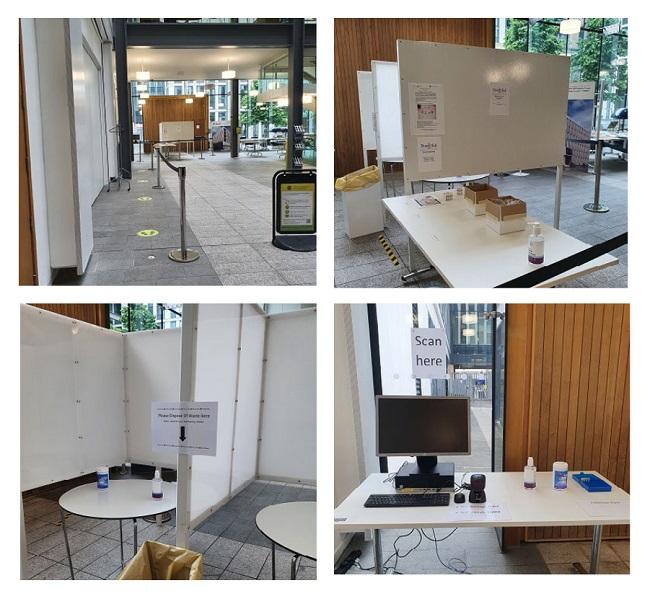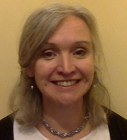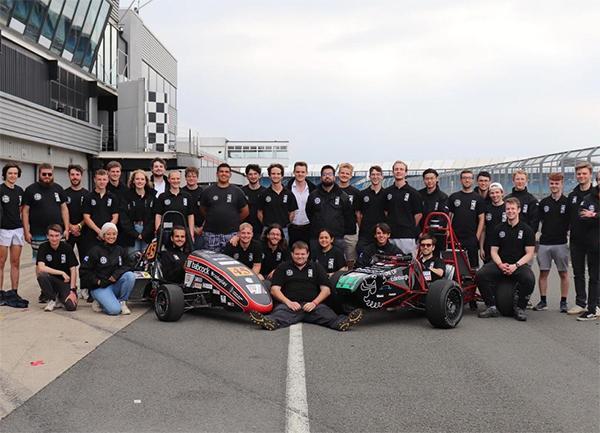Informatics Newsletter September 2021
Issue 50 of our School newsletter for students and staff.
A Message from the Head of School

Dear Colleagues,
The start of semester this year has brought a number of challenges as both staff and students are confronted with the realities of the current landscape of restrictions. There has been considerable relaxation compared to earlier in the year when the campus was essentially closed, but we are still subject to Scottish government regulations that limit class sizes and the extent of mixing on campus. Nevertheless there are a lot more people around and it has been great to see both staff and students back on campus.
Thus the start of the academic year has brought a mixture of excitement and anxiety, together with some disappointment and frustrations on all sides. Nothing is quite how we would like it to be. In our respective roles we can all seek to make it a little better. Anxiety can be tempered by establishing and keeping some simple rules. Everyone should adhere to the University guidelines the key messages of which are:
- Wear a face covering
- Respect other people’s space
- Recognise that others may feel more cautious
- If you have symptoms of Covid-19, self-isolation immediately and book a PCR test.
In addition, everyone is encouraged to take regular asymptomatic tests, either lateral flow tests or the saliva test via TestEd. (There is more information about TestEd later in the newsletter.) If you are unwell, even if you are sure it is not Covid-19, please do not come on campus; and if you do have Covid-19 please remember to report your case to the University using the appropriate form:
Self-isolation reporting form and support (students)
Self-isolation reporting form (staff)
In what continues to be a difficult time we should all seek to look after each other by showing a little extra care and patience in our interactions. This is a transitionary period and we are all hoping for greater relaxation in the future. But in the meantime let’s all seek to make the current situation as good as it can be.
With best wishes,
Jane
New Staff
Research Staff
Hao-Tsung Yang started on 1st September as a Research Associate in LFCS
Elizabeth Crites started on 1st September as a Research Associate in LFCS
Iris Kyranou started on 1st September as a Research Associate in IANC
Guillem Ramierez Santos started on 1st September as a Research Associate in ILCC
Sharan Maiya started on 15th September as a Research Associate in Speckled
Academic Staff
Uta Hindrichs started on 1st September as a Reader in Data Visualisation
Antonio Vergari started on 9th September as a Lecturer in Machine Learning
Announcements

TestEd COVID-19 Testing Project
Please participate in our COVID-19 testing project - TestEd – aiming to identify "asymptomatic" cases and make studying and working within the University’s campus safer for all. Individuals who test positive will be advised to self-isolate and seek a follow-up NHS diagnostic test.
TestEd COVID-19 Testing is free, easy to use, accurate and state of the art, with results that returned to participants confidentially. So far, 31 positives have been detected and notified, many of them before any symptoms appeared.
The University have a state of the art robotic testing lab and, if successful, the Edinburgh system is likely to be replicated by many other Universities and organisations.
More information about TestEd Covid-19 Testing
Please remember to register and consent online before their samples can be accepted.
Register for TestEd Covid-19 Testing
Returning to campus
The School of Informatics believes that a vibrant teaching and research environment, and a world-class student and staff experience, require the presence of our staff on campus. To achieve this, the School will pursue a hybrid working approach, as part of which all groups of staff are expected to spend approximately 50% of their normal hours on campus, averaged over a two-week period. Working hours can be flexible, so that colleagues travelling to work by public transport can avoid busy times.
Our return to campus will coincide with the return of students at the start of semester 1, though the return of different groups of staff will be staggered.
Read return to campus approach
All Informatics’ staff and PGR students returning to work in Appleton Tower, Wilkie Building, or the Forum or the Bayes Centre must complete the return to campus induction.
The induction comprises 3 steps:
- Review the School's policies: Fundamentals, Beyond Zero Measures, and Building User Guide
- Complete the University's mandatory training on fire safety and returning to the University estate
- Submit the 'Informatics Buildings Access Registration Form'
Launch return to campus induction
For any questions you might have about the current measures and operational procedures in the School of Informatics buildings in response to Covid-19, please see our frequently asked questions page.
Facilities and new operational procedures FAQs (secured)
Protect yourself from scams
The University of Edinburgh are aware of a number of scams circulating, including scammers contacting students asking for bank details. Be wary of unexpected calls or emails and never give out personal or financial information.
Highlights
Prakash Panangaden to deliver 2021 Milner Lecture
‘From bisimulation to representation learning via metrics’, this year’s University of Edinburgh Milner Lecture will be given by official visitor of the School of Informatics, Prakash Panangaden from McGill University.
The lecture will be held on Thursday 30 September at 16:10 (UTC+1), physically in Informatics Forum room G.03, and virtually on Zoom.
Those wishing to attend physically must register for a physical attendance ticket via the Eventbrite page by 16:10 Tuesday 28 September, subject to availability based on room capacity.
Those outside Informatics who wish to attend online are requested to register for online attendance by 12:00 (UTC+1) Thursday 30 September. Current Informatics staff and research students will also receive the meeting link by internal email before the event.
Abstract and event registration

Jane Hillston receives Royal Society of Edinburgh Lord Kelvin Medal
Jane Hillston has been awarded the RSE Lord Kelvin Medal for her work, including developing the first compositional framework for the quantitative analysis of systems. This pioneering work has had widespread applications in engineered and natural systems.
"Lord Kelvin serves as an example to us all, with a career that encompassed not only significant research achievement, innovation and invention, and considerable service to his scientific community and the country. Thus, I am deeply honoured to be the recipient of the 2021 RSE Lord Kelvin Medal." - Professor Jane Hillston
Royal Society of Edinburgh press release
Doors Open Days 2021
The weekend of Saturday 25th and Sunday 26th September were Doors Open Days, a chance to explore some of Edinburgh’s architecturally and culturally significant buildings. From heritage landmarks to the city’s newest architecture, Doors Open Day offers free access to properties that are either not usually open to the public or would normally charge an entry fee. The event also offers the public an opportunity to find out more about the capital's public buildings.
The School of Informatics occupy two iconic buildings within the University's central campus: Appleton Tower and the Informatics Forum, and so we have been participating in Doors Open Day for several years, opening our spaces to visitors. This year due to restrictions caused by the pandemic, we decided to instead offer a virtual tour of our buildings through video, 360 degree photos and facts about their history and development.
Our neighbours at King's Buildings and Bayes Centre did so too, allowing the public to digitally explore and experience our spectacular interiors and exteriors.
Doors Open Day 2021 - Explore the School of Informatics
InfHR Update
Annual leave recording in People and Money
We are aware of a few ongoing issues with annual leave balances in People and Money and we are awaiting a fix from the systems team. Due to this, InfHR are receiving a high number of annual leave queries and therefore please expect a delay in response to these queries.
For queries regarding working patterns, please email the HR Helpline or raise a service request via the ‘Help Desk’ section of People and Money.
For further People and Money guidance, please see below.
End to end process user guides
Research Data Management Update
Open Access requirements
Open Access policies remain unchanged throughout the current COVID-19 situation, and the expectation is that accepted manuscripts are deposited in Pure within three months of the date of acceptance. If there are concerns about meeting Open Access deadlines, please contact Sam (email below) and he will be happy to advise.
As always, please continue to send details of recently accepted papers and open access questions, and Sam will respond to your query.
Equality, Diversity and Inclusion
Updates for students and staff
Bullying and harassment
The university has a zero-tolerance stance towards bullying and harassment. We encourage all students and staff to read through the links below.
What constitutes bullying and harassment including examples of such behaviour
For more information on support, guidance for students and staff who experienced or were accused of bullying and harassment, as well as updates on the University Don’t Cross The Line campaign are below.
More information including support, guidance and Don't Cross the Line campaign
Help and Support in Informatics
If you are a taught student and experience bullying or harassment, contact your personal tutor, copying the student support team.
If you are a research student, you can get in touch with your primary or secondary supervisor. You can also get in touch with personal tutors for research students (Jane Hillston and John Longley) who have regular “drop-in” hours (contact the IGS for the blackboard links).
More information for PGR students
Students (taught and research) can also contact Advice Place, which is part of the student association and has professional advisers who give a confidential, non-judgemental and free service.
Staff can speak with their line managers in the first instance. If this is not possible you may contact the dignity and respect advisors.
Email dignity and respect advisors
If you (student or staff) are in physical danger, or in need of medical attention call the emergency services on 999. If you experience a hate crime, call the police at 111.
The EDI Committee
The purpose of the EDI Committee is to facilitate a positive culture across Informatics by celebrating difference, challenging prejudice and ensuring fairness and equality of opportunity.
If students or staff wish to discuss any issues related to equality, diversity or inclusion, they might want to get in touch with any member of the School’s EDI committee or get in touch with the EDI director, Vijay Nagarajan.
Making Informatics Courses Inclusive
The University of Edinburgh is taking action against racism in its various forms - personal, cultural and institutional.
The University's Anti-Racist Action Plan for 2020/21 sets out steps that will be taken to tackle inequalities, racism and racial prejudice on an institutional level. It is recognised that we must challenge and rework the current pedagogy, which was rooted in imperial and colonial ideas about knowledge and learning, and make the syllabus more diverse, more international or more inclusive. It is open to interpretation what “decolonising” means in a discipline that was invented largely after the colonial age, but we are taking it to be an opportunity to re-examine what we teach so that we can identify and remove any barriers to participation, making the curriculum and learning experience as inclusive as possible.
Read the report on activities undertaken so far
Imposter Syndrome
Do you often doubt your skills and talents? Do you second-guess your own accomplishments, despite objective external evidence of your competence? This is a psychological pattern called Imposter syndrome and is extremely common in academic settings. In fact, recent research has observed that about 57% of undergraduate Computer Science students in a large North American institution exhibit frequent feelings of this phenomenon.
Wikipedia definition of the imposter syndrome
Identifying the Prevalence of the Impostor Phenomenon Among Computer Science Students
Researchers and imposter syndrome
Roadblocks to innovation: Creating inclusive research communities
Evidence Base and STEM Equals invite you a series of six panel discussions focused on institutions' responsibilities for creating more inclusive research cultures starting on the 6th of October 2021 with ‘Am I Valued Here?’ at 3.30pm BST held online using Zoom and all are free to attend.
Ethics update
Ethics office hours
The Informatics ethics committee will continue to hold an office hour every first Monday of the month, 4pm-5pm during semester 1 (04 October, 01 November, 06 December). The session is attended by one member of the ethics committee. Staff and students are welcome to join the office hour via the Teams link below and to discuss questions around ethics and ethics applications.
Link for office hour first Monday of the month, 4-5pm
Please take the time to review the information available on our pages before attending, including the FAQs.
Link to InfWeb Ethics and Integrity pages
Students should discuss specific ethics questions with their supervisor before attending the office hour (open to both students and supervisors).
Student news
Research paper by Informatics student accepted for OpenSym 2021 conference
A research paper ‘Extracting and Visualizing User Engagement on Wikipedia Talk Pages’ authored by Carlin MacKenzie, BSc Computer Science student at the School of Informatics, alongside Dr John R. Hott from the University of Virginia School of Engineering and Applied Science, has been accepted for the OpenSym 2021 conference.
The paper explores the outputs of ‘Namespace Database’, an open-source extraction and visualisation tool that automates the creation of a database of Wikipedia edits, the visualisations of the resulting database, and potential research directions.
"I am very proud of the determination it took to publish this paper, and I'm extremely grateful for the support I've received from my supervisors abroad. There were moments that nearly stopped this project in its tracks, like when a hardware failure lost us weeks of database creation time, but our persistence has allowed me to be published as a first author." - Carlin MacKenzie
Informatics Student selected as Huawei UK R&D Fellowship 2021 recipient

Ludovic Capelli, a PhD Student and member of the Centre for Doctoral Training in Pervasive Parallelism at the School of Informatics, has been awarded the Huawei UK R&D Fellowship 2021 for the compiler division.
After 3 rounds of evaluation with 7 reviewers for selected candidates from hundreds of applicants, Ludovic Capelli was selected as most commendable against key criteria including research background, research impact, academic achievement and recommendation letters.
Ludovic’s research focuses on the optimisation of the vertex-centric programming model for graph processing.
The Huawei Fellowship Programme supports the development of talented Ph.D. students to solve the most challenging problems in their disciplines and make innovative breakthroughs in computing technologies.
As well as funding to cover tuition fees, maintenance and conference travel expenses, the fellowship contains mentorship from industry experts and access to Huawei’s global research facilities.
Ludovic Capelli's personal page

EUFS AI Team win ADS Class Competition at Formula Student UK 2021
Congratulations to the Edinburgh University Formula Student team for an overall Autonomous Driving System (ADS) victory at Formula Student UK 2021 in Silverstone, and an all time best result of 21st in Formula Student Class.
Though they had hoped to take a driverless race car to this year's FS UK competition at Silverstone, disruption to lab access caused by the pandemic meant the EUFS AI Team were unable to complete the build as planned. They did, however, compete in the static events and by doing so won the overall ADS class competition. The team also gained valuable feedback on the progess of their autonomous racing vehicle and believe they are on track for completing the project for the 2022 competition.
Staff news

Paper by Sharon Goldwater and former Informatics student receives ISCA Award
Sharon Goldwater and her former PhD student, Herman Kamper, have been awarded the ISCA Award for the Best Research Paper published in Computer Speech and Language for their paper: 'A segmental framework for fully-unsupervised large-vocabulary speech recognition'.
Each year, the International Speech Communication Association (ISCA) awards 3 best student papers at INTERSPEECH based on anonymous reviewing and presentation at the conference. Each paper is awarded 250 euros to be split between the student authors. Best Papers of Speech Communication, Computer Speech and Language are also announced by ISCA during INTERSPEECH.
Herman Kamper and Sharon Goldwater(School of Informatics, University of Edinburgh) alongside Aren Jansen (Google, Inc.), have co-authored the winning article for this year's ISCA Award for the Best Research Paper published in Computer Speech and Language (2016-2020).

Ram Ramamoorthy mentors at IEEE RAS Developing Country Faculty Engagement Program
Ram Ramoorthy, Personal Chair of Robot Learning and Autonomy at the School of Informatics, is participating in the The IEEE Robotics and Automation Society (RAS) Developing Country Faculty Engagement Program.
The program aims to help faculty in developing countries compete successfully in publishing their research at top RAS conferences and journals by connecting them with assigned RAS mentors.
His role as mentor, is to help a faculty member from an institution in a developing country develop their research programme and participate in the worldwide robotics community. Ram's mentee, Dr Issarapong Khuankrue, from King Mongkut’s University of Technology Thonburi, Thailand, will work on human guidance to enable robotis automation for his project 'Developing human-robot collaboration with a cognitive architecture model'.
Developing Country Faculty Engagement Program
Outreach and Public Engagement
If you have participated in an outreach and public engagement activity in the last six months, please make sure it has been recorded by the Comms team in the directory below.
Informatics Outreach and Public Engagement Directory
If you need to add an entry, would like to get involved in a public engagement activity or promote an opportunity that you are aware of, please use the webform below.
For the latest opportunities please check CSE PE blog for more info.
Edinburgh Science Festival - Call For Ideas 2022
This is an open call offering you the chance to be part of the 2022 Edinburgh Science Festival, which will run from Saturday 9 – Sunday 24 April with the theme of Revolutions.
The call is open to anyone – individuals, groups or organisations – with bright ideas and a passion for communicating them. Participants from diverse fields across the sciences, arts and cultural sectors are welcome. For 2022, there is particular interest in ideas about outdoor walks, tours and trails and workshops for children, families and adults that can be delivered inside or outdoors.
The deadline for submitting an event idea to us is Friday 15 October.
Find out more about submitting a proposal
Call for Ideas - University's Edinburgh Science Festival programme, deadline: 1st Oct
As part of the Edinburgh Science Festival, the Public Engagement team in the Edinburgh Research Office and the College Leads for Public Engagement will be coordinating a curated programme of events and activities in partnership with the National Museums of Scotland. Categories of interest include interactive workshops, drop-in activities, self-guided walking tours, and outdoor activities.
The application deadline for this programme is 1st Oct and decisions will be communicated by 8th Oct, in order to give time for those who have not been successful to submit their idea directly to the general Call for Ideas if they wish (see above).
To apply to the University's programme, submit your proposal through the webform below.
Apply to the University's SciFest programme
Call for contributors - Fun Palaces Scotland, 1st-3rd October
The Fun Palaces weekend of action is all about connecting locally and celebrating the skills and passions we all have in tiny and not-so-tiny ways for, with and by communities. Fun Palaces offers an opportunity to engage communities on their terms, much more than a science festival would. This year, Fun Palaces is taking place on 1st-3rd Oct.
There are three main ways to get involved with Fun Palaces Scotland:
a) host a free community-led event/gathering
b) offer a specific challenge
c) join the hybrid Fun Palaces Scotland TV interview reel
Further details about all of these routes can be found on the Fun Palaces Scotland page. Ahead of the Fun Palaces weekend, there are a number of planning workshops to assist anyone and everyone who is considering being involved. You can find the dates/times of these workshops, and reserve your place at any of them, through the Eventbrite booking page.
Fun Palaces workshops – book your place
Call for contributors - I'm a Scientist/Engineer, Get Me Out of Here platforms
A new academic year means a new series of online engagement with school pupils from I'm a Scientist/Engineer. All researchers (including Postgraduates) and technicians are invited to take part in I’m a Scientist/Engineer, which are online engagement platforms that help pupils stay connected with STEM. You’ll develop your communication skills and gain a fresh perspective on your work (and maybe win £500), all while showing pupils that science/engineering roles can be for them.
You fill in a profile page, answer pupils' questions, and use the text-based chat system. Everything happens online; you take part from your desk or smartphone. There’s no need to prepare activities or leave your office, lab or house. Each discussion zone usually lasts for four weeks, and there is an ongoing application process. The zones that are opening up over the next few months - including the Space Zone, Clean World Zone and UK Black History Zone - can be found on the page below.
If you identify as a scientist, then visit the page below for further details and to sign-up.
Alternatively, if you identify as an engineer, then visit the website below.
Verna from CDSI in NLP took part in I'm a Scientist last year - you can read her testimonial below.
Call for inputs - A Scientist Just Like Me
The Primary Science Teaching Trust is developing a new resource aimed at primary school children called A Scientist Just Like Me. The aim is to encourage learners to find out more about the work of real scientists and help to broaden their understanding of what a scientist does.
The aim will be achieved through a series of short slideshows to introduce children to a diverse range of current scientists. They are including people of different genders, ethnic backgrounds, declared disabilities, and from many different fields of science. They envisage that the slideshows will be used by teachers in different ways – perhaps as stand-alone fifteen-minute discussion activities or included in a unit of work that relates to the work of the scientist.
If you would like to be part of the collection, register your interest through the page below where you can also find out more about the project.
Call for volunteers - Data Kirk
Data Kirk’s mission is to create a hands-on environment for people to get curious, creative and confident with data. There are two fantastic opportunities for students/staff to get involved: Data Mentors and/or STEM Education Tutors.
If you wish to find out more, please email Chuks Ododo or register through the Data Kirk volunteering page.
Register to take part in Data Kirk
Rethink SciComm - Connecting with Underserved Audiences, 29th Sept
Science Communication usually reaches audiences who are typically white, affluent, have high levels of formal education and are already interested in science. To break the status quo, this workshop on 29th Sept will explore the approaches and roles of science communicators today that could foster improved connections with underserved communities. Session attendees will also be able to explore their own practices.
Further details, and registration, is available through the page below.
Call for content - Edinburgh Impact
Communications and Marketing have launched Edinburgh Impact: an approach to sharing inspirational content that reflects the priorities of Strategy 2030 and our institutional research themes under the following headings: Research with Impact, Inspiring Minds, Our People, Opinion, and Our Shared World.
The focus is on content (long-form written pieces and video) that has a personal element - it is not about sharing facts and figures. The approach doesn't rely on external audiences navigating our Edinburgh Impact webpages, but through actively sharing content via the University's main social media channels, including paid promotional posts/tweets, and then monitoring what works and doing more of that.
The Editorial Board has access to the REF case studies that have been recently submitted and will be liaising with the people involved in these to publish pieces over the next few months. However, they are also open to suggestions for other new content pieces that align with one or more of the Edinburgh Impact headings.
If you have any suggestions, please email contacts Kasia Kokowska, Informatics Marketing, Communications and Outreach Manager.
Call for respondents: the future of UK Science and Discovery Centres
A new survey has been launched to explore the future of Science and Discovery Centres in the UK. The survey is open to anyone: those who work in science centres, visit them, or are a science communicator or informal science practitioner in any way, shape or form. The survey has been commissioned by UKRI and Wellcome and aims to support thinking around the innovations of Science and Discovery Centres over the next 10 years.
The survey should take 10-15 mins to complete and is available through this Typeform page.
Advice: Hook Your Audience - informal science engagement
Hook Your Audience is a new guide - available online for free until end-Oct 2021 - that presents a range of performance techniques to engage child/family audiences in interactive presentations. It's mainly aimed at informal educators, but it could be useful to anyone who is planning on engaging children / young people / family groups. The purpose of the guide is to encourage readers to reflect on how they grab the interest and retain the attention of the audiences they are trying to engage. Key elements throughout include focusing on emotionally connecting with your audience, as well as the importance of the performer's/communicator's character and personality in presenting their messages.
The full publication is available on this introductory page, while a section-by-section summary of key points is also available
New network: Public Engagement Trainer's Forum, 7th Oct
In order to go beyond personal networks and become more inclusive, is there value in a new UK network for people who devise and deliver training in science communication and public engagement? The NCCPE and the BIG STEM Communicators Network have been exploring these questions and will be hosting their first meeting on 7th Oct for people who deliver public engagement and science communication training. This will present an opportunity to meet some new people, reflect on the training being offered, and most importantly share and reflect on some of the great work being done and how the training ecosystem could be improved.
More details and a sign-up link are available in this blog-post.
Webinars: Digital Engagement Masterclasses
The UK Association for Science and Discovery Centres recently ran three masterclasses that covered evaluation, digital storytelling, digital accessibility, and keeping communities engaged. If you are wrestling with any of these topics, the recordings and slides from each of the masterclasses are available through the ASDC website. Also on that page is a list of accessibility tools that could be worth consulting when putting content together for websites or presentations (e.g. the 'check accessibility' function that can be found in Microsoft software under the tools tab).
Training: Voice and Presentation Skills, IAD, 12th or 19th Oct
The Voice and Presentation Skills workshop enhances your awareness of what makes your voice and interesting and sustainable and how you can use your body effectively to engage your audience and reinforce your message. The focus is on communicating your message, not on technical aids or producing slides. There are two upcoming sessions - 12th Oct and 19th Oct - which are both currently available for research staff and students to book.
Further details, and booking links, are available through the IAD training pages.
Training: An Introduction to Public Engagement with Research, IAD, 13th Oct
This introductory workshop reflects on how to get started in public engagement with research and deals with questions such as will anyone be interested in what I do, and how do I reach these people and work with them? The next edition of this workshop takes place on 13th Oct and is open to research staff and students.
Further details, and booking links, are available through the IAD training pages.
Training: SciComm, Beyond the Basics
Suitable for all backgrounds, the Global Science Show has just launched a new online science communication course which aims to build skills, increase knowledge and enable the creation of high-quality science communication content. The course involves six sessions that cover aspects like how to be engaging, project management, and running social media. As well as the sessions, there is an online space for participants to share ideas, get advice and start new collaborations.
The course costs £240 and there is one free place in each cohort. Prior to the main course, a couple of taster sessions are being run to allow people to discover the basics of science communication and what to expect in the full programme, You can register to taster sessions via the link below.
Funding: CSE Public Engagement Seed Fund, deadline: 6th Oct
The second round of the CSE's pilot Public Engagement Seed Fund is currently open. This fund supports small-scale Public Engagement with Research ideas from early career researchers (including PhD researchers) with funding of up to £750 per project. Potential applicants should discuss their ideas with members of the Public Engagement Advisory Group in advance of submitting applications. The first-stage deadline is 6th Oct.
Public Engagement Advisory Group
Staff Training Courses
We now have a page listing training courses attended by staff. You can submit your own feedback on a particular training you attended.
List and feedback on training courses
Events
Research Seminar: Queer in AI
Monday 4 October 2021, 18:00 – 19:30 BST
The next University of Edinburgh Staff Pride Network research seminar will be with Sabine Weber who will talk about Queer In AI, an organisation dedicated to supporting queer + trans folks in AI.
More information and registration
Best of InfGeneral
This month's best of inf-general award goes to everyone who recommended noise-cancelling headphones to Maria Wolters. As we are all gradually moving back to on-campus life - but not ditching our online meetings, noise-cancelling headphones will become more and more popular!
Sony WH-1000XM3 and WH-1000XM4 took the top spots and Bose QuietComfort were voted the third choice. Anker Life Q30 Hybrid Active and Sony Anker Life Q30 Hybrid Active were the more affordable recommendations.
You can find more ratings under the link below, provided by Arno Proeme and quoted by Maria:
Arno also provided a good article on killing the background noise (before it kills your productivity).
Inf-general is a mailing list used to carry informal discussions, postings, requests to and from staff within Informatics. Not for official purposes. Julian Bradfield is the guardian of the inf-general who steps in to point out misuses and confirm when the inf-general should most definitely be used. If you’re new to Informatics inf-general emails can be a great source of knowledge for you: ask and you will be informed, but do remember to share the information back with the mailing list users.
Keep in Touch
For all the latest news, keep an eye on our website and social media channels!
Informatics Communications team website
Edinburgh Informatics Alumni group on LinkedIn
The newsletter is produced by the Communications team.
If you have any questions or comments please get in touch!
Share your news
